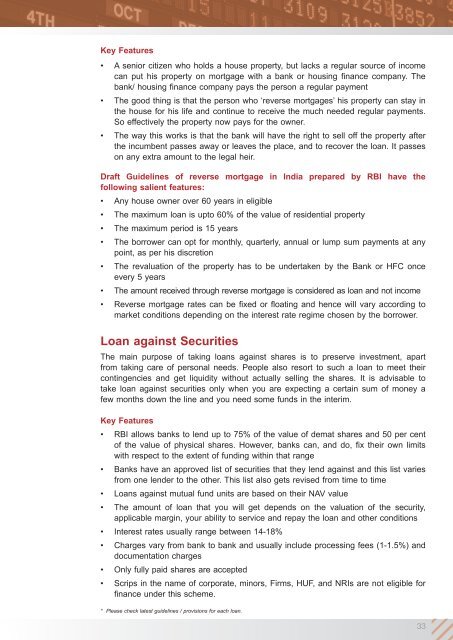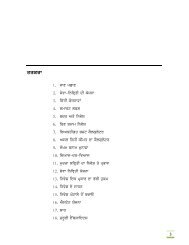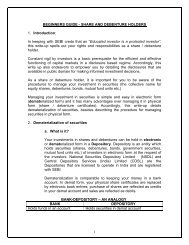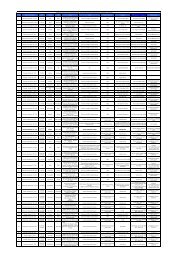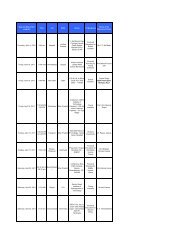Booklet - SEBI Investor Awareness Website - Securities and ...
Booklet - SEBI Investor Awareness Website - Securities and ...
Booklet - SEBI Investor Awareness Website - Securities and ...
You also want an ePaper? Increase the reach of your titles
YUMPU automatically turns print PDFs into web optimized ePapers that Google loves.
Key Features• A senior citizen who holds a house property, but lacks a regular source of incomecan put his property on mortgage with a bank or housing fi nance company. Thebank/ housing fi nance company pays the person a regular payment• The good thing is that the person who ‘reverse mortgages’ his property can stay inthe house for his life <strong>and</strong> continue to receive the much needed regular payments.So effectively the property now pays for the owner.• The way this works is that the bank will have the right to sell off the property afterthe incumbent passes away or leaves the place, <strong>and</strong> to recover the loan. It passeson any extra amount to the legal heir.Draft Guidelines of reverse mortgage in India prepared by RBI have thefollowing salient features:• Any house owner over 60 years in eligible• The maximum loan is upto 60% of the value of residential property• The maximum period is 15 years• The borrower can opt for monthly, quarterly, annual or lump sum payments at anypoint, as per his discretion• The revaluation of the property has to be undertaken by the Bank or HFC onceevery 5 years• The amount received through reverse mortgage is considered as loan <strong>and</strong> not income• Reverse mortgage rates can be fi xed or fl oating <strong>and</strong> hence will vary according tomarket conditions depending on the interest rate regime chosen by the borrower.Loan against <strong>Securities</strong>The main purpose of taking loans against shares is to preserve investment, apartfrom taking care of personal needs. People also resort to such a loan to meet theircontingencies <strong>and</strong> get liquidity without actually selling the shares. It is advisable totake loan against securities only when you are expecting a certain sum of money afew months down the line <strong>and</strong> you need some funds in the interim.Key Features• RBI allows banks to lend up to 75% of the value of demat shares <strong>and</strong> 50 per centof the value of physical shares. However, banks can, <strong>and</strong> do, fi x their own limitswith respect to the extent of funding within that range• Banks have an approved list of securities that they lend against <strong>and</strong> this list variesfrom one lender to the other. This list also gets revised from time to time• Loans against mutual fund units are based on their NAV value• The amount of loan that you will get depends on the valuation of the security,applicable margin, your ability to service <strong>and</strong> repay the loan <strong>and</strong> other conditions• Interest rates usually range between 14-18%• Charges vary from bank to bank <strong>and</strong> usually include processing fees (1-1.5%) <strong>and</strong>documentation charges• Only fully paid shares are accepted• Scrips in the name of corporate, minors, Firms, HUF, <strong>and</strong> NRIs are not eligible forfi nance under this scheme.* Please check latest guidelines / provisions for each loan.33


